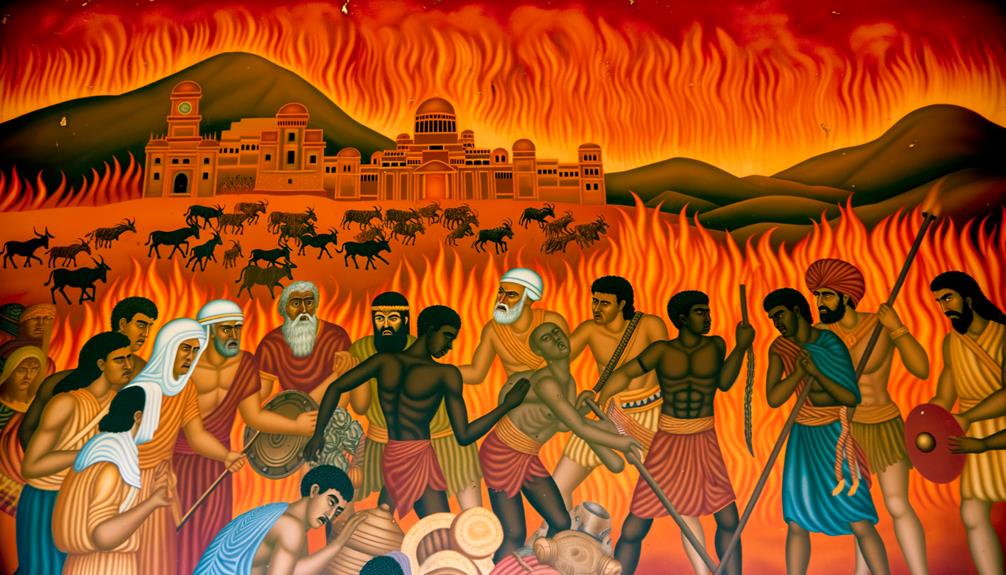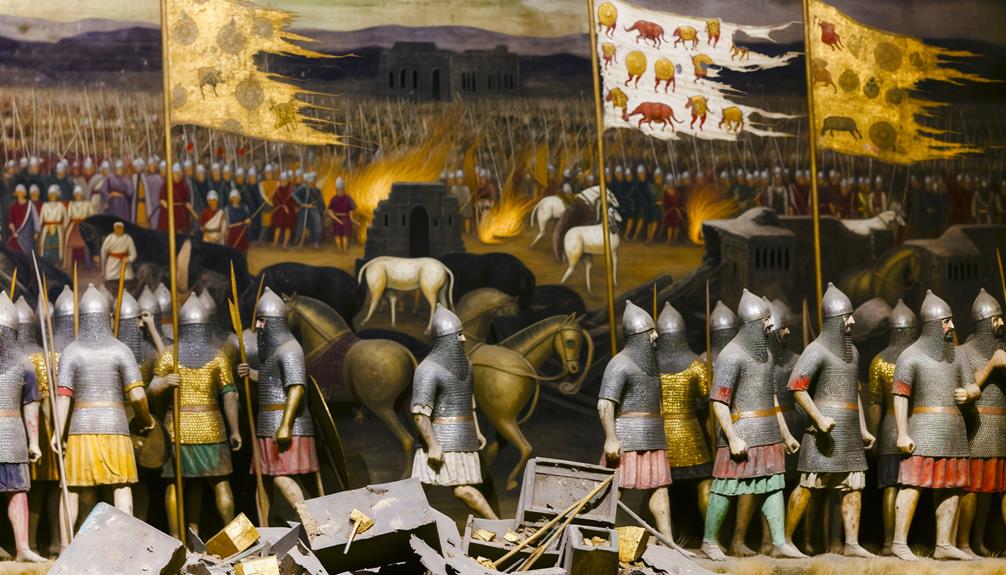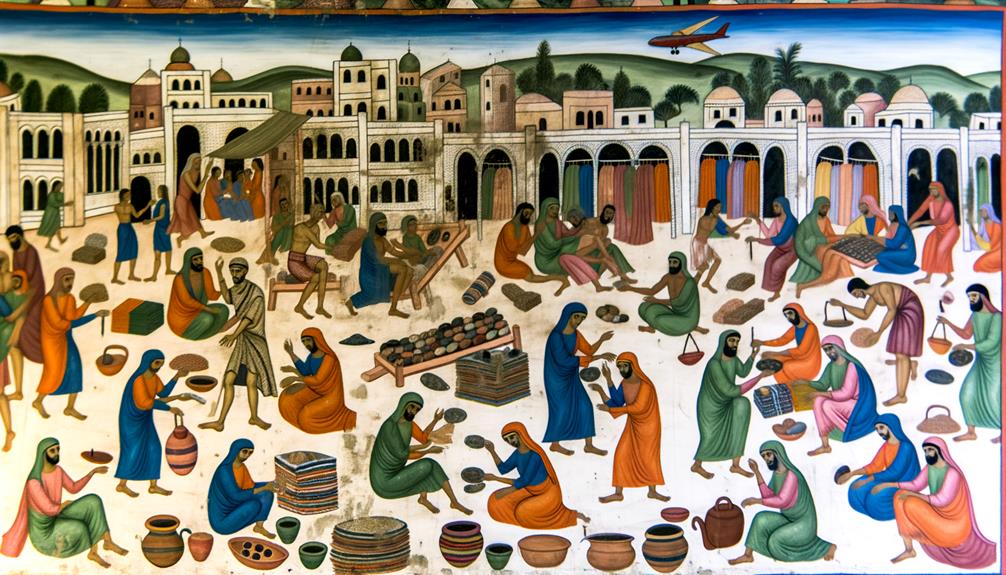Spoil in the Bible Meaning: Plunder and Divine Justice
In the Bible, ‘spoil‘ refers to valuables and goods seized by victorious armies, signifying divine favor or judgment. The Old Covenant frequently documents spoil in contexts such as the fall of Jericho (Joshua 6) and David’s battles (1 Samuel 30), underscoring spoil as a manifestation of God’s will.
In the New Covenant, the concept shifts to spiritual victories, with Christ’s triumph over evil depicted as taking spoil (Colossians 2:15). Spoil serves as a tangible representation of divine justice and collective responsibility, enriching the understanding of scriptural narratives and their theological implications.
Explore further to understand its broader cultural and moral dimensions.

Spoil Meaning in the Bible: Biblical Definition and Symbolism
| Aspect | Details |
|---|---|
| Word | Spoil |
| Language Origin | Latin spolium, meaning plunder or booty |
| Biblical Usage | Frequently used in Old Testament warfare contexts |
| Meaning | Goods or treasures taken after victory in battle |
| Context Examples | “And they took all the spoil, and all the prey…” |
| Associated Themes | Conquest, reward, judgment, divine justice |
Definition of Spoil

In the context of the Bible, the term ‘spoil‘ generally refers to the goods or valuables seized by victorious armies after a battle or conflict.
Scripturally, ‘spoil’ encompasses not only physical items such as gold, livestock, and other material wealth but also human captives and territories. This practice is prevalent in various biblical narratives, symbolizing divine retribution or favor.
The appropriation of spoil often served as a tangible manifestation of God’s judgment or blessing. The term is deeply embedded within the socio-cultural and historical milieu of the biblical era, reflecting the norms of warfare and conquest.
Understanding the multifaceted implications of ‘spoil’ necessitates a thorough examination of its occurrences and significance within the biblical canon.
Spoil in Old Testament

When examining the Old Scriptures, the concept of ‘spoil‘ emerges as a recurrent element in narratives of warfare and divine intervention.
In the Old Covenant, ‘spoil’ often refers to the goods, livestock, and captives taken by victors in battle, as seen in books like Joshua and Judges. Deuteronomy 20:14 details directives on the treatment of spoil, highlighting its theological significance in Israelite society.
Spoil was not merely material gain but also a manifestation of divine favor and judgment. The allocation of spoil could symbolize God’s blessing upon His chosen people or His retribution against enemies.
Consequently, spoil in the Old Covenant encapsulates a complex interplay between divine will, martial success, and societal norms.
Spoil in New Testament

In the New Covenant, the concept of spoil extends beyond mere material wealth to encompass the victory and spoils of spiritual warfare.
Analyzing passages such as Colossians 2:15, it becomes evident that Christ’s triumph over principalities and powers is portrayed as a form of spoil.
This spiritual victory underscores the theological implications of spoil, highlighting the transformative shift from physical plunder to spiritual conquest and redemption.
Spoil as Material Wealth
The New Scripture frequently references ‘spoil‘ in the context of material wealth, often illustrating the spiritual dangers associated with earthly possessions.
In Matthew 6:19-21, Jesus admonishes His followers to ‘lay not up for yourselves treasures upon earth,’ highlighting the ephemeral nature of material riches and advocating for spiritual treasures instead.
Similarly, in Luke 12:15, Jesus warns, ‘Take heed and beware of covetousness: for a man’s life consisteth not in the abundance of things which he possesseth.’
These passages underscore the New Covenant’s caution against the allure of material wealth, presenting ‘spoil’ as a potential hindrance to spiritual growth and moral integrity.
This perspective aligns with broader scriptural themes promoting heavenly over earthly rewards.
Victory and Spoils
While the New Covenant warns against the perils of material wealth, it also recounts instances where victory and its associated spoils are depicted, revealing deeper theological implications.
For instance, the parable of the strong man in Luke 11:21-22 illustrates Jesus’ triumph over spiritual adversaries, symbolizing the redistribution of spoils as a metaphor for liberation.
Additionally, the Acts of the Apostles documents early Christian victories accompanied by material acquisitions that served the communal good.
- Parable of the strong man (Luke 11:21-22)
- Acts of the Apostles: communal wealth redistribution
These examples underscore the nuanced approach of the New Scripture towards spoil, emphasizing moral and spiritual victories over mere material gain.
Spiritual Implications of Spoil
Through examining the New Scripture, one discerns that the concept of spoil transcends mere physical possessions, embodying profound spiritual significance and the ultimate triumph of good over evil.
In Colossians 2:15, Paul illustrates this victory, stating, ‘And having spoiled principalities and powers, he made a shew of them openly, triumphing over them in it.’ This depicts Christ’s victory over spiritual forces, presenting spoil as the liberation from sin and the reclaiming of righteousness.
Additionally, Ephesians 4:8 speaks of Christ’s ascension, where He ‘led captivity captive and gave gifts unto men,’ symbolizing the redistribution of spiritual wealth.
Consequently, in the New Covenant, spoil signifies the spiritual redemption and the dispensation of divine grace to believers.
Spoil in Warfare

The concept of spoil in biblical warfare holds significant theological and cultural implications, as seen in numerous Old Scriptures narratives where victors seized goods, livestock, and captives.
The distribution of these spoils among warriors was often regulated by divine commandments, reflecting a structured approach to material gains post-conflict.
Contemporary ethical considerations challenge the ancient practices, prompting a reevaluation of how such scriptures inform modern perspectives on the morality of war and its economic aftermath.
Biblical Spoils Significance
In biblical times, the spoils of warfare held profound significance, often symbolizing divine favor and the redistribution of wealth among the victors. Scriptural narratives frequently underscore the importance of spoils, reflecting theological and socio-economic dimensions.
Key aspects include:
- Divine Favor: Victories and their spoils were seen as blessings from God, affirming His support for His people.
- Wealth Redistribution: Spoils served as a means to balance resources, redistributing wealth acquired from defeated enemies.
Theologically, spoils reinforced the notion that success in battle was divinely sanctioned, aligning with the broader biblical theme of God’s providence and justice.
Distribution Among Victors
A critical aspect of warfare in biblical narratives involves the methodical distribution of spoils among the victors, reflecting both divine ordinance and communal equity.
Scripturally, the allocation of spoils was often directed by God’s commandments, as seen in Numbers 31:27, where the spoils from the Midianites were divided equally between the soldiers and the community. This practice underscored the theological principle that victory in battle was granted by divine intervention, thereby necessitating a fair distribution.
Additionally, in 1 Samuel 30:24, David decreed that those who stayed with the supplies would share equally with those who fought, reinforcing the idea of collective responsibility and reward.
Such procedures guaranteed that the community adhered to divine justice and maintained unity post-conflict.
Ethical Considerations Today
Modern ethical considerations regarding the spoils of warfare frequently challenge traditional perceptions, necessitating a re-examination of ancient practices in light of contemporary moral standards.
Historically, the distribution of spoils was seen as a legitimate reward for victors. However, modern views emphasize:
- Human rights: Ensuring that the dignity and rights of all individuals, including non-combatants, are upheld.
- International law: Adherence to treaties such as the Geneva Conventions, which explicitly prohibit plundering.
Scripturally, these principles align with the prophetic calls for righteousness and mercy, urging a departure from practices that dehumanize and exploit.
Such reflections challenge us to uphold a higher moral standard in contemporary conflict.
Spoil and Wealth

The concept of spoil in the Bible is often intertwined with the acquisition and redistribution of wealth, reflecting the socio-economic dynamics of ancient biblical times.
Spoil, typically garnered through conquest or divine intervention, served as a means of wealth accumulation and societal reorganization.
For instance, in Joshua 6:19, the spoils of Jericho were consecrated to the Lord, illustrating the theological dimensions of wealth.
Additionally, Deuteronomy 20:14 outlines the distribution of spoil among victors, embedding wealth within the fabric of community and covenant.
These scriptural references indicate that spoil was not merely material gain but played a pivotal role in reinforcing divine order, social structures, and communal identity within the biblical narrative.
Spoil as Divine Favor

Interpreted as a manifestation of divine favor, spoil in the biblical context often signifies God’s blessing and providence bestowed upon His chosen people. The acquisition of spoil following victories in battle was seen not merely as material gain but as a tangible sign of divine approval. Scriptural narratives frequently underscore this theological perspective, revealing deeper spiritual truths.
- Joshua 8:27 depicts the Israelites taking spoil from Ai as a direct command from God, symbolizing His support.
- 2 Chronicles 20:25 illustrates the vast spoil collected by Jehoshaphat’s army, representing God’s deliverance.
Thus, spoil serves as a testament to God’s faithfulness and favor throughout biblical history.
Spoil and Cultural Context

Examining spoil within its cultural context reveals its multifaceted significance in ancient Near Eastern societies, encompassing economic, social, and religious dimensions. Economically, spoils of war, including livestock, precious metals, and captives, were pivotal in wealth accumulation and redistribution.
Socially, the distribution of spoil among warriors reinforced hierarchies and allegiances. Religiously, offerings from spoils were often dedicated to deities, signifying divine favor and consecration.
| Aspect | Significance |
|---|---|
| Economic | Wealth accumulation, resource redistribution |
| Social | Reinforcement of hierarchies and alliances |
| Religious | Offerings to deities, divine consecration |
Understanding spoil in these contexts provides deeper insight into its role and the values of ancient societies.
Notable Biblical Examples

Numerous biblical passages illustrate the concept of spoil, highlighting its prominence in narratives of conquest and divine intervention.
For example, the fall of Jericho in the Book of Joshua reveals the Israelites’ acquisition of spoil as divinely ordained.
Similarly, the account of David recovering plunder from the Amalekites underscores God’s provision in battle.
In the New Covenant, Jesus’ parable of the strong man alludes to the spoiling of a house, symbolizing spiritual victory.
- Jericho’s fall: Israelites capture spoil as directed by God (Joshua 6).
- David and the Amalekites: Reclamation of plunder exemplifies divine favor (1 Samuel 30).
These examples underscore spoil’s theological and historical significance.
Lessons From Spoil

The motif of spoil in biblical narratives offers profound insights into divine justice, providence, and the moral responsibilities of those who receive God’s favor.
Scriptural accounts, such as the Israelites’ acquisition of Egyptian wealth during the Exodus (Exodus 12:35-36) and the spoils of Jericho (Joshua 6:18-19), underscore the principle that material blessings are intertwined with divine purpose.
These episodes illustrate that spoil, while a token of victory, demands ethical stewardship.
The misappropriation of spoil, as seen in Achan’s transgression (Joshua 7:1), results in divine retribution, highlighting the criticality of obedience and integrity.
Consequently, spoil serves not merely as a reward but as a test of faithfulness to God’s commandments, emphasizing accountability and righteousness in the covenant relationship.
Conclusion
The concept of ‘spoil‘ in biblical texts serves as a nuanced metaphor for divine favor and material wealth obtained through conquest.
An illustrative example is the Israelites’ acquisition of Egyptian gold during the Exodus, symbolizing liberation and divine intervention.
This narrative underscores the complex interplay between divine providence, material gain, and cultural context within scripture.
Such stories invite deeper reflection on the ethical and spiritual dimensions of wealth and power in human societies.






